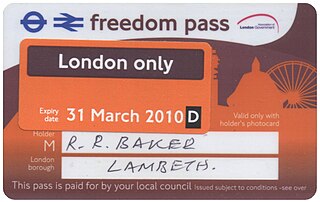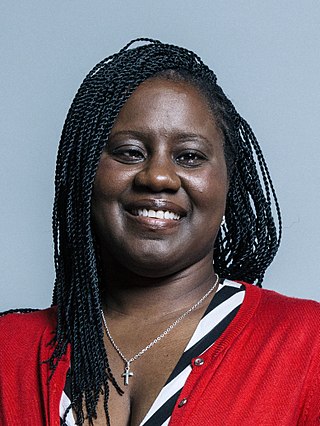Ruth Bashall | |
|---|---|
| Born | Ruth Parsons 23 May 1952 23 May1952 Bromsgrove, England |
| Died | 11 November 2023 (aged 71) London, UK |
| Education | London School of Economics |
| Spouse | Alan Bashall (m. 1971. div. 1977) |
| Children | 1 |
Ruth Bashall (b. Bromsgrove England, 23 May 1952, d. London, England 11 November 2023) was an activist for lesbian and disability rights. [1] [2] She co-founded Stay Safe East, an organisation that supports disabled survivors of abuse, in 2010. [3]
Bashall was born to Bill Parsons, an economist, and Joan, a translator and English teacher. The family moved to Paris in 1954, where Bashall learned French at Lycée Blaise Pascal. She returned to the UK in 1970 to study sociology at the London School of Economics, graduating with a BSc in 1975. She married Alan Bashall in 1971, they had a daughter the following year. They divorced in 1977. [4]
Bashall worked as a bus conductor from 1977 to 1981, then at a community bookshop from 1981 to 1984. She was a transport researcher for the Campaign to Improve London’s Transport (CILT) from 1984 to 1990. [5] She was a local council access worker for the London Borough of Waltham Forest from 1990 to 1996, [6] and a policy officer from 1996 to 1999. In 1999 she became an independent disability equality trainer and consultant. [7] From 2007 to 2017 she advised the Metropolitan Police and Greater London Authority on domestic and sexual violence and disability hate crime. [8] [9]
Bashall came out as lesbian in the mid-1970s. At around the same time she helped to establish the Lesbian Mothers’ Group, a group dedicated to winning lesbians the right to keep their children after separating from their male partners. [10] She also joined the London Lesbian Line collective and was a member of the disabled gay rights group, Regard. [11] With Hillary Torrence she co-organised Women for Improved Transport (WTI) in 1984, with the objective of calling “attention to the needs of all women using London Transport, with particular regard to matters of safety and access.” [12]
Bashell became a wheelchair user [13] and experienced “numerous incidents of disability-targeted hostility on the buses”, including a driver who refused to come close enough to the kerb for her to board, saying “she shouldn’t be out at that time of night” (it was 10pm on a weekday). [14] In 1989 she co-founded Campaign for Accessible Transport (CAT). [15] She was one of the “Oxford Street 16”, who were arrested after direct action by CAT and held in a police cell “while the police hunted out a means of getting 16 disabled people to an inaccessible court.” [16]
She set up Stay Safe East with Nicholas Russell in 2010, the “first disabled people’s organisation dedicated to tackling violence and abuse against disabled people from diverse communities”. [17] She was initially the charity's CEO, [18] and later became its policy and projects advisor. She retired from this role a few days before she died. [19]
Bashall was:
In the early 2000s, she set up and, with Anne Novis, co-chaired the Metropolitan police's Disability Independent Advisory Group (DIAG). [26]

Accessibility is the design of products, devices, services, vehicles, or environments so as to be usable by people with disabilities. The concept of accessible design and practice of accessible developments ensures both "direct access" and "indirect access" meaning compatibility with a person's assistive technology.

Carys Davina Grey-Thompson, Baroness Grey-Thompson,, known as Tanni Grey-Thompson, is a Welsh life peeress, television presenter and former wheelchair racer.

Freedom Pass is a concessionary travel scheme, which began in 1973, to provide free travel to residents of Greater London, England, for people with a disability or over the progressively increasing state pension age. The scheme is funded by local authorities and coordinated by London Councils. Originally the pass was a paper ticket, but since 2004 it has been encoded on to a contactless smartcard compatible with Oyster card readers, and since 2010, also ITSO card readers.

Leah Lakshmi Piepzna-Samarasinha is a Canadian-American poet, writer, educator and social activist. Their writing and performance art focuses on documenting the stories of queer and trans people of color, abuse survivors, mixed-race people and diasporic South Asians and Sri Lankans. A central concern of their work is the interconnection of systems of colonialism, abuse and violence. They are also a writer and organizer within the disability justice movement.

Leonard Cheshire is a major health and welfare charity working in the United Kingdom and running development projects around the world. It was founded in 1948 by Royal Air Force officer Group Captain Leonard Cheshire VC.
Disability abuse is when a person with a disability is abused physically, financially, sexually and/or psychologically due to the person having a disability. This type of abuse has also been considered a hate crime. The abuse is not limited to those who are visibly disabled or physically deformed, but also includes those with learning, intellectual and developmental disabilities or mental illnesses.
Disability hate crime is a form of hate crime involving the use of violence against people with disabilities. This is not only violence in a physical sense, but also includes other hostile acts, such as the repeated blocking of disabled access and verbal abuse. These hate crimes are associated with prejudice against a disability, or a denial of equal rights for disabled people. It is viewed politically as an extreme form of ableism, or disablism. This phenomenon can take many forms, from verbal abuse and intimidatory behaviour to vandalism, assault, or even murder. Although data are limited studies appear to show that verbal abuse and harassment are the most common. Disability hate crimes may take the form of one-off incidents, or may represent systematic abuse which continues over periods of weeks, months, or even years. Disabled parking places, wheelchair access areas and other facilities are frequently a locus for disability hate. Instead of seeing access areas as essential for equity, they are seen instead as 'special treatment', unjustifiable by status, and so a 'reason' for acting aggressively. Denial of access thus demonstrates a prejudice against equal rights for disabled people; such actions risk actual bodily harm as well as limiting personal freedom.
Sophie Morgan is a British television presenter and disability advocate who is paraplegic. She is a social media influencer. She became a presenter after appearing on reality television. In 2021, she was a lead presenter for Channel 4's TV coverage of the Summer Paralympics in Tokyo. She has been voted one of the most influential disabled people in the UK as part of the Shaw Trust's Disability Power 100. Morgan has been working on television for almost twenty years.
Disability in the United Kingdom covers a wide range of conditions and experiences, deeply impacting the lives of millions of people. Defined by the Equality Act 2010 as a physical or mental impairment with a substantial and long-term adverse effect on a person's ability to carry out normal day-to-day activities, it encompasses various aspects of life, including demographics, legislation, healthcare, employment, and culture. Despite numerous advancements in policy and social attitudes, individuals with disabilities often encounter unique challenges and disparities.

Diane Kingston, is a human rights defender and international development specialist. She is the Global Technical Lead for Disability Rights and Equalities Sightsavers and a volunteer for Shout- the mental health crisis text service
Domestic violence within lesbian relationships is the pattern of violent and coercive behavior in a female same-sex relationship wherein a lesbian or other non-heterosexual woman seeks to control the thoughts, beliefs, or conduct of her female intimate partner. In the case of multiple forms of domestic partner abuse, it is also referred to as lesbian battering.
Maddy Coy is the deputy director of the Child and Woman Abuse Studies Unit (CWASU), London Metropolitan University and has collaborated with the End Violence Against Women Coalition (EVAW).

Marsha Chantal de Cordova is a British politician serving as Member of Parliament (MP) for Battersea since 2017. A member of the Labour Party, she was a Member of Lambeth London Borough Council from 2014 to 2018. Since 2024, De Cordova has served as Second Church Estates Commissioner.
Caroline Gillian Gooding was a British solicitor and activist for disabled people. She took up activism after having a stroke while in her early 20s. Gooding directed her efforts to publishing literature advocating a human rights-based approach to disability, advising, assisting and leading governmental disability commissions, and drafting government legislation to improve the status of disabled individuals, such as the Disability Discrimination Act 1995, the Disability Discrimination Act 2005 and the Equality Act 2010. The Caroline Gooding Memorial Lecture is named after the activist.
Ruth Madeley is a British actress known for her roles in Years and Years, The Rook and Doctor Who. She was born with spina bifida and has worked with the charity Whizz-Kidz for much of her life. She was nominated for a television BAFTA in 2016 for her work in Don't Take My Baby.
The Disabled People's Direct Action Network (DAN) is a disability rights activist organisation in England and Wales that campaigned for civil rights with high-profile street demonstrations involving civil disobedience, rallies and protests.
Shani Dhanda is a British disability activist. She was named to the BBC's 100 Women in 2020 and has been named to the Shaw Trust Power 100 on several occasions, earning the title of the UK's most influential disabled person in 2023. Dhanda founded the Asian Disability Network and helped organise the first-ever Asian Woman Festival in the UK.
Rights Now, sometimes written with an exclamation mark, was a British umbrella group of disabled people's organisations and charities which campaigned for a change in the law to prevent discrimination against disabled people and for a full civil rights law, even though the result was the flawed Disability Discrimination Act 1995. The biggest protest in numbers of people was in July 1994 at Trafalgar Square and Whitehall, London. It was a very broad-based campaign, including trade unions for example. Campaigning to improve the laws for full civil rights continued, but Rights Now as a group ended in 1995.
Amy Kavanagh is a British disability rights activist and advocate. Kavanagh is registered as blind, and was born with a complex visual impairment called ocular albinism, which has led to her vision loss. In 2017 she became more prominent as a disability campaigner, after she began writing online about her experiences navigating the world as a blind Londoner alongside her guide dog, Ava. Kavanagh also drove a social media campaign to encourage people to ask for consent before offering assistance. Kavanagh was a finalist in the Royal National Institute for the Blind See Differently Awards 2019, and her campaign was awarded the Campaign of the Year at the Transport for All Awards 2020.

The accessibility of public transport services in Greater London is incomplete. Much of the rail network in London was built before accessibility was a requirement. Unlike in the United States, Underground stations built in the 1960s and 1970s made no provision for the disabled, with wheelchair users banned from deep level Underground lines until 1993.
{{cite report}}: CS1 maint: multiple names: authors list (link)